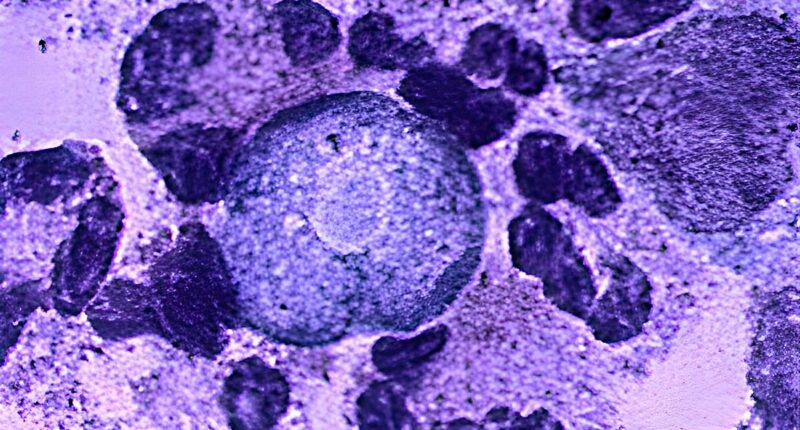Share this @internewscast.com
A child from South Carolina died of an infection caused by a brain-eating amoeba after visiting a popular local lake to go swimming.
No name or age has been released for the young patient, but the South Carolina Department of Public Health (DPH) stated that exposure likely occurred at Lake Murray in Columbia, South Carolina.
The child was treated at Prisma Health Children’s Hospital but he later died from complications related to a Naegleria fowleri infection.
Officials announced that the case was confirmed on July 7.
Naegleria fowleri is commonly called a brain-eating amoeba because it causes a brain infection that is typically fatal.
Official records show 164 people in the US were infected with the disease between 1962 and 2023, of which only four survived.
The child had gone swimming at Lake Murray and he was diagnosed on July 7.
The lake was originally constructed to provide hydroelectric power to all of South Carolina and it was once the world’s largest man-made reservoir.
Today, it draws tens of thousands of visitors with dozens of picturesque beaches and swimming spots, along with fishing and sailing activities.
There had been no prior warnings about the lake being contaminated with bacteria or other harmful organisms and health experts say that despite the recent incident, there is not an elevated risk associated with the body of water.

A child from South Carolina died of an infection caused by a brain-eating amoeba lurking in a local swimming lake
The US only suffers a handful of deaths from brain-eating amoebas each year, usually among people swimming in warm water lakes and rivers.
Texas is among the states that have suffered the largest burden of brain-eating amoeba cases, with 39 of the 164 cases recorded in the US occurring in the Lone Star state.
While Naegleria fowleri infections remain rare, there is concern that they may become more common due to climate change.
The single-cell organism, which thrives in warm waters, kills 97 percent of the people it infects as it causes a disease called primary amoebic meningoencephalitis, also known as PAM or amebic meningitis.
Initial symptoms include a headache, vomiting and nausea. A person can then suffer cognitive issues and a stiff neck as things progress.
It causes severe swelling, and eventually rotting, of the brain and spinal cord. This will almost always eventually lead to death.
There are no known effective treatments for PAM.
Only several Americans have ever survived after being infected with Naegleria fowleri. This includes Caleb Ziegelbauer from Florida, who was 13 years old at the time he was stricken by the microscopic species.
Caleb is now walking somewhat but the damage done to his brain means he needs to communicate with facial expressions and has to use a wheelchair.
Officials believe the South Carolina child was infected while swimming in their local lake.
The incident is not the first case of a Naegleria fowleri infection in South Carolina and there have also been other deaths linked to to the organism over recent years.
In June, a 71-year-old woman from Texas contracted an infection and died from Naegleria fowleri after she rinsed her sinuses with tap water from an RV’s water system at a campground.
And in 2023, a 16-month-old toddler from Arkansas died after coming into contact with the same one-celled organism at a water playground with fountains and jets.
The amoeba, which is 1,200 times smaller than a dime, enters the body through the olfactory nerve which connects the upper nose to the brain.
This gives it a short and direct route into the brain. If water containing the amoeba enters the nose, it will likely lead to infection.
Ingesting water through the mouth is ok because stomach acid is strong enough to kill the amoeba. The nose is its only route.
Once a person’s olfactory nerve is exposed, it can take around one to nine days to start experiencing symptoms. They will usually die within five days of symptoms first appearing.
‘It’s quite rapid, it’s very progressive. It literally eats the brain tissue,’ Dr Anjan Debnath, a parasitologist at the University of California San Diego, explained.
Because of the rare infection, doctors also often misdiagnose symptoms as meningitis – wasting valuable time that could be used to treat the parasite.

Only several Americans have ever survived after being infected with Naegleria fowleri. This includes Caleb Ziegelbauer from Florida, who was 13 years old at the time he was stricken by the microscopic species (pictured)
He describes the infection as taking part in two stages. The first is relatively minor, with the person experiencing a headache and other flu-like symptoms.
This means that unless a doctor knows that a person has been swimming in untreated water they may not even suspect the amoeba.
Once symptoms reach the second stage, a person will start experiencing severe neurological issues like seizures.
A doctor will then likely find out about the infection through a spinal fluid test.
America suffers around three cases of the amoeba each year.
They will almost always occur over summer, when many families flock to local lakes and ponds for a daytime outing.
Dr Debnath still advises against swimming in untreated water over summer, especially in places like Florida and Texas where temperatures get exceptionally high.
Because the amoeba only resides in fresh water, swimming in the ocean is generally safe.
If families do choose to visit a freshwater beach, anyone entering the water should wear a nose clip to prevent water from entering their nose.
Dr Debnath also recommends against kicking up dirt or sand from the bottom of the lake as warmer areas deep down are where the microscopic beings usually lie.













